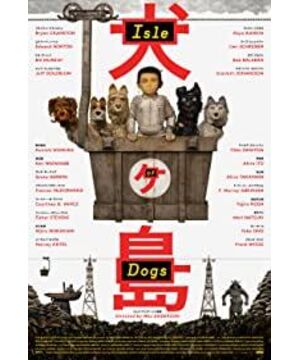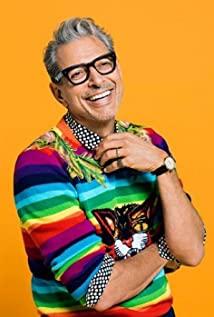Editor's note: How cute puppies and unequal doom are presented in a movie.
"Canis Island" is a very intriguing animated film from the picture to the plot. At first, I looked at the soft-looking dog, guessing that this is another animation praising the friendship between a boy and an animal. After watching it, I realized that what it wants to express is far from simple.
There are many metaphors in this film, extending into the context of history, and it is very likely that it refers to World War II. When the little boy’s plane landed on the island and released a mushroom cloud, when the blonde and white-skinned international students led the Japanese students to shout the slogan to the overbearing mayor... I felt that this movie was not that simple, let One can't help but think of another "little boy"; "little boy" may refer to the atomic bomb "little boy" dropped by the United States at the end of World War II. The emperor lifted the divine power; but in the end, although the mayor stepped down, he was "washed out" in the name of family affection. The butler carried all the pots and remembered that after World War II, some of the war initiators whose hands were covered with innocent blood escaped history. The trial, this reminds me of anger.
In addition to the profound metaphor of history, from the perspective of power relations between individuals, this film also touched me in many ways. When the stray dog Chief said "I don't believe in the master"; when the show dog said "On breed, I am a show dog, on hair style, I am also a show dog, but in terms of my ideas...", people The complex relationship with dogs goes far beyond the limit of "dogs are man's best friends".
When Chief appeared, his appearance and lines were so indulgent. He expressed disdain for several companions who missed the status given by human beings. He disobeyed the boy's orders. He scattered and fluffy hair. Standing from the perspective of an outsider, I immediately liked it. With this dog, his performance is awe-inspiring.
However, the direction of the story later was that Chief put aside his self-esteem a little bit, step by step toward surrender, and eventually became a "loyal dog". This irony highlights the director's profound skills. In the name of love, fisting warmth, softly speaking, dispelled an unruly soul.
Initially, when the boy Atari first landed on the Isle of Dogs and fell heavily on the ground full of garbage. Several dogs sighed "Is this child abuse?" In the eyes of dogs, they seemed to be close to people. Equal relationship. Even the dog is a strong person relative to the abused child, and the strong person tries to help the weak. But after the little boy escaped from danger, he gave orders to the dogs and told them to "sit down." At this time, Chief ignored the little boy's order, but was disciplined by his companions. The companions not only obeyed the little boy, but It also puts invisible pressure on disobedient companions.
I can't help thinking of a book at hand, called Discipline and Punishment, which was written by French philosopher Michel Foucault. The book describes and analyzes the power relationships that exist in social phenomena, and treats prisoners in prison. From torture deterrence to system admonitions, the invisible pressure within the group partially replaces tangible punishment, and it regulates and regulates people’s behavior. limited. After all, the works of philosophy and sociology are somewhat abstract, and they need to be concrete. In "Canis Island", the four dogs except Chief should have been continuously intensively trained from childhood until the corresponding conditioned reflexes are formed. When they hear human commands, they will obey, and they will not think about whether it is appropriate or not. Chief didn't. He dismissed it. At this time, the Chief who did not comply with the social norms accepted by four or more dogs was pressured by his peers, which can be regarded as a punishment. For socialized people (dogs), being abandoned by most of their companions will bring about a fear of falling into loneliness, which is more subtle than the punishment brought by a big stick, and is less likely to arouse the sense of resistance, but the effect may not be as great. It's awesome.
Why is there such a power relationship between boys and dogs? Is it because the boy subjectively wants to enslave the dog and punish the Chief who disobeys him? No, the boy's heart is not only unsubjectively malicious to dogs, but also full of good feelings. He said in Japanese "You are my dog now". This is a kind of identification. It is what the boy learned to treat dogs in his past education. Ways to express identification. When the boy is in a coma, the relationship between the dog and the boy is closer to equality, and when the boy wakes up, this well-established order suddenly comes into play. Just as we know that “marriage” is an unequal relationship between men and women, but there are still men who say “I will marry you” when expressing love to women. It is very likely that this man does not disrespect women subjectively. It's just the way he expresses love to women that he learned from adults when he was a child; there are still women who are moved when they hear this sentence, which is also constructed by society. But if conversely, when women say "I marry you" to men, friends with equality consciousness may feel that this is a kind of trespassing the traditional gender order, although the pursuit of gender equality rather than conversion of oppressive subjects, this It is an expression of resistance to oppression. Men and women who do not have gender equality consciousness are likely to think that this woman is "wonderful". If the man answers "Yes I do", it may trigger a kind of black humor based on status contrast, or to the man. Contempt, such as "eating soft rice."
Just imagine, if a dog gives orders to a boy and makes him "sit down", what will be the effect? Maybe it's just hilarious, after all, the boy may just play a game of experiencing the life of a dog. But is the power relationship between the boy and the dog reversed? After careful experience, it doesn't seem to be.
The inequality of the social order is not the result of individual evil, nor can the individual's goodness be fully improved.
But even if the boy has no subjective malice, he does not respect the dog. For example, Chief made it clear that he did not accept the game of "picking up sticks", and the boy still threw the sticks out and expected him to pick them up. At this time, Chief used a sad gesture to compromise, and still defended his self-esteem at the end. Why would he compromise? It is undeniable that there is a friendship between Chief and the boy. Chief looked at each other's expectant gaze and couldn't bear to refuse, fearing that the friendship would break. But the boy does not need to worry about this problem. For the weaker side of power, there is an additional hidden cost of maintaining the seemingly equal relationship.
Chief’s principle was broken, but he gradually compromised and obeyed the boy, and the whole story developed in the direction of "the domineering president fell in love with me". Yes, a dog who is obedient and obedient casually, the boy does not bother to "tame" them. In comparison, taming a more ambitious and powerful dog makes him "willingly" to become his guard dog, right? More challenging and fulfilling?
Why can't Chief resist the boy's tame, is it really because the boy is too strong, and his own servility is hidden? No, the boy is just an ordinary human child. He is not as swift and agile as a dog. He has the rules set by the society for a human like him, which he can use handily. The power of structure is difficult for an individual (dog). Totally resisting.
Do dogs have freedom of choice? Yes, it only looks like a sky, but in fact it is just a small cage.
Author丨Li Shuangyu
Edit 丨 silently
View more about Isle of Dogs reviews











